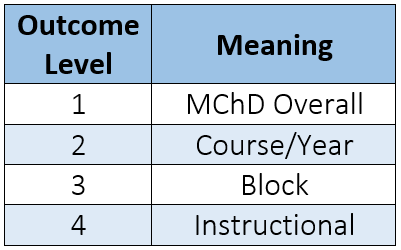Level 3 Learning Outcomes – Block 3 (Endocrine and Reproductive Health)
Outcome 3.3.1: Describe the anatomy and histology of the male and female genital tract and endocrine system.
Outcome 3.3.2: Explain the physiology of the reproductive and endocrine organs and the pathophysiology of diseases affecting them.
Outcome 3.3.3: Discuss the reproductive system including embryology and apply this knowledge to simple clinical scenarios.
Outcome 3.3.4: Explain how the endocrine and reproductive systems maintain homeostatic conditions.
Outcome 3.3.5: Discuss how diseases, including genetic disorders, can affect the normal function of endocrine and reproductive systems.
Outcome 3.3.6: Describe the structure and function of microorganisms that can affect the urogenital tract.
Outcome 3.3.7: Define the metabolic pathways and regulatory mechanisms of carbohydrate, protein and lipid metabolism.
Outcome 3.3.8: Discuss the pharmacological and non-pharmacological management of diabetes and outline the principles and mechanisms of glucocorticoid medication.
Outcome 3.3.9: Describe the principle mechanisms of the immune system and how defects can contribute to pathology.
Outcome 3.3.10: Describe the menstrual cycle, methods of contraception, ovulation, spermatogenesis, fertilisation and the course of pregnancy, parturition and menopause.
Outcome 3.3.11: Summarise the mechanisms of blood glucose regulation including insulin secretion and action, explain the pathophysiology of hypoglycaemia and diabetic hyperglycaemic emergencies and describe the principles of subcutaneous insulin administration and self-monitoring of blood glucose levels.
Outcome 3.3.12: Describe the normal pattern of growth in childhood and adolescence and its endocrine regulation.
Outcome 3.3.13: Explain the pathophysiology of hypoglycaemia and diabetic hyperglycaemic emergencies.
Outcome 3.3.14: Explain how to complete a research ethics application including analysis of the literature, clinical governance, patient safety, statistical relevance, clinical decision making and professionalism.
Outcome 3.3.15: Identify the social processes of institutionalising and mainstreaming of medical knowledge.
Outcome 3.3.16: Outline the issues related to sexual health, gender identity and sexual orientation in a culturally, socially and ethically sensitive manner.
Outcome 3.3.17: Demonstrate skills in medical advocacy, interpret epidemiological data to understand the burden and risk factors of major endocrine diseases, and discuss health promotion strategies.
Outcome 3.3.18: Further develop clinical reasoning skills in Problem Based Learning practical sessions through the integration of information from lectures, Laboratory-based practical sessions and clinical skills tutorials, and consideration of population health and social aspects of endocrine and reproductive system disorders.
Outcome 3.3.19: Obtain a history from patients needing care during pregnancy or childbirth, or whose presenting complaint(s) suggest(s) a disorder of the endocrine and/or reproductive systems, to elucidate the progress of pregnancy or childbirth or the cause of the illness and its impact on well-being, and define the biological, social and psychological context of management;; demonstrate system specific physical signs and interpret them in physiological and pathological terms;; integrate clinical pathology, clinical physiology and imaging investigations with history and physical signs.







